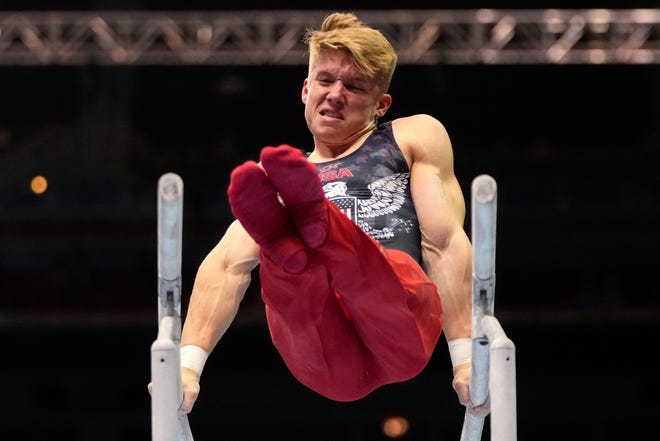
ST. LOUIS — The Minnesota athletics department would have been better sitting this one out.
No sooner had Shane Wiskus been introduced as a member of the U.S. men’s gymnastics team for the Tokyo Olympics on Saturday night than the department posted a congratulatory Tweet. Complete with not one, not two, but three photos of Wiskus competing in his Minnesota uniform.
A uniform that now qualifies as a relic, given Minnesota’s decision last fall to cut its men’s gymnastics team.
“I have a lot of things in my head right now,” Wiskus said when he was asked about the Tweet.
Oh, I can just bet.
Wiskus was among the most vocal critics after Minnesota announced in October that it was cutting three men’s sports – gymnastics, tennis and indoor track – and he hasn’t backed off an inch. When Stanford reversed its decision to cut 11 sports last month, Wiskus took a screenshot of the announcement and sent it to Minnesota athletic director Mark Coyle.
You can be sure a few more nastygrams are in store.
“I have not had time to look at my phone quite yet,” Wiskus said, less than an hour after learning he was going to Tokyo. “We'll definitely have to send Mr. Mark Coyle a message or two.”
OPINION:Biles is going to push gymnastics limits – no matter what judges say
OLYMPICS: Sign up for our newsletter to follow Team USA's quest for gold in Tokyo
Coyle said COVID-19 was partially to blame for his decision to cut the three sports, saying the pandemic had decimated Minnesota’s budget and left the Gophers with a shortfall of between $45 million to $65 million. Now, I’m no math genius, but I fail to see how cutting a gymnastics program with a $750,000 budget does much to wipe out that big of a deficit.
Especially when, four months later, you hire a basketball coach who you will pay almost $2 million a year. And have a football coach who made almost $4.3 million last year.
But that’s just me.

Men’s gymnastics programs are low-hanging fruit for athletic directors who lack imagination, fiscal discipline or both, and find themselves with budgets awash in red ink. God forbid you should have one less football assistant or scrap those plans to add a new wing to the Taj Mahal of practice facilities when you can cut a program that costs you the equivalent of pennies.
And because smaller sports like men’s gymnastics get scant time in the spotlight, athletic directors can take comfort in knowing no one will raise much of a stink if they disappear.
But it’s lazy. Worse, it has a ripple effect that will eventually hurt the U.S. Olympic movement.
Of the five men who made the Olympic team Saturday night, every one of them came through an NCAA program. Brody Malone competes at Stanford and is the current NCAA champion. Yul Moldauer helped Oklahoma win three NCAA titles. Sam Mikulak was a three-time NCAA champion when he was at Michigan, where he also led the Wolverines to two team titles. Alec Yoder competed at Ohio State.
NCAA CHAMP:Brody Malone headlines U.S. Olympic men's gymnastics team
TOKYO BOUND?:Meet the U.S. Olympic men's gymnastics team
When these programs are cut, as they have been with shocking speed in the last decade, where is the next generation supposed to come from?
“It should send a message to all the athletic directors and university presidents out there that if they're thinking about adding sports, that men’s gymnastics is thrilling,” said Brett McClure, the men’s national team director.
“And it breeds excellence and Olympians.”
Oh, schools love to brag on their Olympians, and promote the medals they win as if they’re their very own. But when it comes to sustaining the kind of support that actually makes a difference, too many are quick to cry that there’s nothing but dust bunnies in their pockets.
Minnesota is happy to congratulate Wiskus now. But where were these folks when he was forced to move to the U.S. Olympic and Paralympic Training Center after his team was cut? That kind of upheaval typically does not make for good Olympic preparation.
Coyle and the Minnesota bean counters knew Wiskus was on the Olympic track. He was part of the U.S. team that finished fourth at the 2019 world championships, and was one of the gymnasts sent to an event in Tokyo last year that Olympic organizers used to prove they could pull off next month’s Games.
But it made not one iota of difference in their calculations.
“It was just like one thing after another,” Wiskus said. “I've just been through the wringer, and I kind of told myself that I've been through enough and I'm ready to show what I can do at this competition.”
And ready to show Minnesota what a big mistake it made.
“Just thank you for the time there,” Wiskus said when asked what he’d say to people in Minnesota’s athletic department. “And happy I got out when I did.”
Follow USA TODAY Sports columnist Nancy Armour on Twitter @nrarmour.








